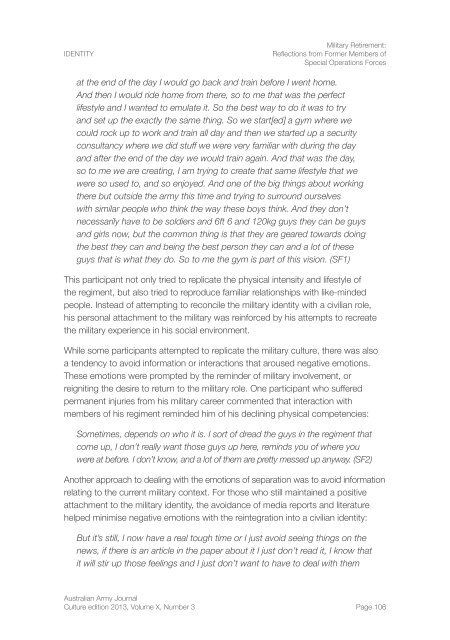Australian Army Journal
Australian Army Journal
Australian Army Journal
You also want an ePaper? Increase the reach of your titles
YUMPU automatically turns print PDFs into web optimized ePapers that Google loves.
IDENTITY<br />
Military Retirement:<br />
Reflections from Former Members of<br />
Special Operations Forces<br />
at the end of the day I would go back and train before I went home.<br />
And then I would ride home from there, so to me that was the perfect<br />
lifestyle and I wanted to emulate it. So the best way to do it was to try<br />
and set up the exactly the same thing. So we start[ed] a gym where we<br />
could rock up to work and train all day and then we started up a security<br />
consultancy where we did stuff we were very familiar with during the day<br />
and after the end of the day we would train again. And that was the day,<br />
so to me we are creating, I am trying to create that same lifestyle that we<br />
were so used to, and so enjoyed. And one of the big things about working<br />
there but outside the army this time and trying to surround ourselves<br />
with similar people who think the way these boys think. And they don’t<br />
necessarily have to be soldiers and 6ft 6 and 120kg guys they can be guys<br />
and girls now, but the common thing is that they are geared towards doing<br />
the best they can and being the best person they can and a lot of these<br />
guys that is what they do. So to me the gym is part of this vision. (SF1)<br />
This participant not only tried to replicate the physical intensity and lifestyle of<br />
the regiment, but also tried to reproduce familiar relationships with like-minded<br />
people. Instead of attempting to reconcile the military identity with a civilian role,<br />
his personal attachment to the military was reinforced by his attempts to recreate<br />
the military experience in his social environment.<br />
While some participants attempted to replicate the military culture, there was also<br />
a tendency to avoid information or interactions that aroused negative emotions.<br />
These emotions were prompted by the reminder of military involvement, or<br />
reigniting the desire to return to the military role. One participant who suffered<br />
permanent injuries from his military career commented that interaction with<br />
members of his regiment reminded him of his declining physical competencies:<br />
Sometimes, depends on who it is. I sort of dread the guys in the regiment that<br />
come up, I don’t really want those guys up here, reminds you of where you<br />
were at before. I don’t know, and a lot of them are pretty messed up anyway. (SF2)<br />
Another approach to dealing with the emotions of separation was to avoid information<br />
relating to the current military context. For those who still maintained a positive<br />
attachment to the military identity, the avoidance of media reports and literature<br />
helped minimise negative emotions with the reintegration into a civilian identity:<br />
But it’s still, I now have a real tough time or I just avoid seeing things on the<br />
news, if there is an article in the paper about it I just don’t read it, I know that<br />
it will stir up those feelings and I just don’t want to have to deal with them<br />
<strong>Australian</strong> <strong>Army</strong> <strong>Journal</strong><br />
Culture edition 2013, Volume X, Number 3 Page 106

















